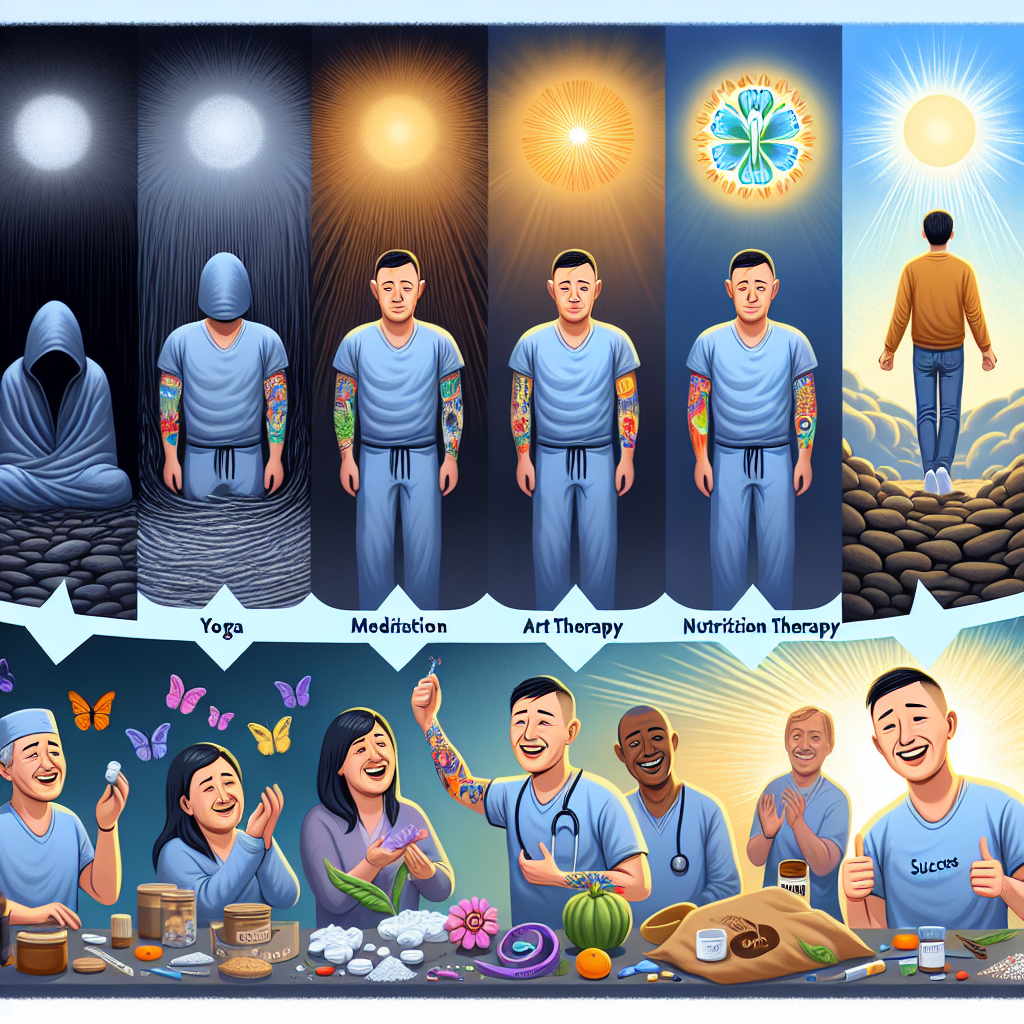-
Table of Contents
“From Detox to Recovery: Navigating the Steps of Heroin Rehab in Dublin”
Introduction
Heroin rehab in Dublin involves a structured process designed to help individuals overcome addiction and achieve long-term recovery. The steps typically include:
1. **Assessment and Evaluation**: Initial assessment to understand the individual’s medical history, addiction severity, and any co-occurring mental health issues.
2. **Detoxification**: Medically supervised detox to manage withdrawal symptoms and safely remove heroin from the body.
3. **Inpatient or Outpatient Treatment**: Depending on the severity of the addiction, individuals may undergo intensive inpatient treatment or participate in outpatient programs.
4. **Therapy and Counseling**: Individual and group therapy sessions to address the psychological aspects of addiction, including cognitive-behavioral therapy (CBT) and other evidence-based approaches.
5. **Medication-Assisted Treatment (MAT)**: Use of medications like methadone, buprenorphine, or naltrexone to reduce cravings and prevent relapse.
6. **Aftercare Planning**: Development of a comprehensive aftercare plan that includes ongoing therapy, support groups, and relapse prevention strategies.
7. **Support Systems**: Engagement with support networks such as family, friends, and community resources to provide ongoing encouragement and accountability.
These steps are tailored to meet the unique needs of each individual, ensuring a holistic approach to recovery.
Understanding the Initial Assessment Process in Heroin Rehab in Dublin
Understanding the initial assessment process in heroin rehab in Dublin is crucial for anyone considering this life-changing journey. The first step in heroin rehabilitation is often the most daunting, but it is also the most critical. This initial assessment sets the foundation for a personalized treatment plan, ensuring that each individual’s unique needs are met. The process begins with a comprehensive evaluation conducted by a team of healthcare professionals, including doctors, therapists, and addiction specialists. This team works collaboratively to gather detailed information about the individual’s medical history, substance use patterns, mental health status, and social circumstances.
During the initial assessment, the individual undergoes a series of interviews and questionnaires designed to provide a holistic view of their condition. These tools help the healthcare team understand the severity of the addiction, any co-occurring mental health disorders, and the individual’s readiness for change. This phase is not just about collecting data; it is also an opportunity for the individual to express their concerns, fears, and hopes for recovery. By fostering an open and supportive environment, the healthcare team can build a trusting relationship with the individual, which is essential for successful rehabilitation.
Following the interviews and questionnaires, a physical examination is conducted to assess the individual’s overall health. This examination may include blood tests, urine tests, and other diagnostic procedures to identify any underlying medical conditions that need to be addressed during treatment. The results of these tests provide valuable insights into the individual’s physical well-being and help the healthcare team develop a safe and effective detoxification plan. Detoxification, or detox, is the process of allowing the body to rid itself of heroin while managing withdrawal symptoms. It is a critical first step in the rehabilitation process, and the initial assessment ensures that it is tailored to the individual’s specific needs.
Once the physical examination is complete, the healthcare team reviews all the gathered information to develop a personalized treatment plan. This plan outlines the recommended course of action, including detoxification, therapy, and aftercare support. The treatment plan is designed to address not only the addiction but also any co-occurring mental health disorders, such as depression or anxiety, that may be contributing to the individual’s substance use. By taking a holistic approach, the healthcare team can provide comprehensive care that promotes long-term recovery.
Throughout the initial assessment process, the individual is encouraged to actively participate in their treatment planning. This collaborative approach empowers the individual to take ownership of their recovery journey and fosters a sense of accountability. It also ensures that the treatment plan aligns with the individual’s goals and values, increasing the likelihood of successful outcomes.
In conclusion, the initial assessment process in heroin rehab in Dublin is a vital step that lays the groundwork for effective treatment. By conducting thorough evaluations, fostering open communication, and developing personalized treatment plans, healthcare professionals can provide the support and care needed to help individuals overcome addiction. While the journey to recovery may be challenging, understanding and participating in the initial assessment process can inspire hope and confidence in those seeking a new beginning.
Exploring the Detoxification and Therapy Stages in Dublin’s Heroin Rehab Programs
Embarking on the journey to overcome heroin addiction is a courageous and transformative decision. In Dublin, heroin rehab programs are designed to provide comprehensive support through various stages, ensuring that individuals receive the care and guidance they need to reclaim their lives. The process typically begins with detoxification, a critical first step that prepares the body and mind for the subsequent phases of recovery.
Detoxification, often referred to as detox, is the process of eliminating heroin from the body. This stage is crucial as it addresses the physical dependency on the drug. In Dublin’s rehab centers, detox is conducted under medical supervision to ensure safety and comfort. Medical professionals may administer medications to alleviate withdrawal symptoms, which can range from mild discomfort to severe pain. These symptoms often include nausea, sweating, anxiety, and muscle aches. The goal of detox is to manage these symptoms effectively, allowing the individual to transition smoothly into the next phase of treatment.
Following detoxification, the focus shifts to therapy and counseling, which are integral components of heroin rehab programs in Dublin. Therapy aims to address the psychological aspects of addiction, helping individuals understand the underlying causes of their substance use. Various therapeutic approaches are employed, including cognitive-behavioral therapy (CBT), which helps individuals identify and change negative thought patterns and behaviors. Additionally, motivational interviewing is used to enhance an individual’s motivation to change, fostering a sense of empowerment and self-efficacy.
Group therapy is another vital element of the rehab process. It provides a supportive environment where individuals can share their experiences, challenges, and successes with others who are on a similar journey. This sense of community can be incredibly uplifting, as it reduces feelings of isolation and fosters a sense of belonging. Moreover, group therapy sessions are often facilitated by experienced counselors who guide discussions and provide valuable insights.
In addition to individual and group therapy, family therapy is also an important aspect of heroin rehab in Dublin. Addiction affects not only the individual but also their loved ones. Family therapy aims to repair and strengthen relationships, improve communication, and address any co-dependency issues. By involving family members in the recovery process, individuals receive a broader support network, which can be instrumental in maintaining long-term sobriety.
As individuals progress through their rehab program, they are also introduced to various holistic therapies that promote overall well-being. These may include mindfulness meditation, yoga, art therapy, and physical exercise. Such activities help individuals develop healthy coping mechanisms, reduce stress, and enhance their emotional and physical health.
The final stage of heroin rehab in Dublin involves aftercare planning. This phase is crucial for ensuring sustained recovery and preventing relapse. Aftercare plans are tailored to each individual’s needs and may include ongoing therapy, support group meetings, and regular check-ins with a counselor. Additionally, individuals are encouraged to build a strong support network, engage in meaningful activities, and set achievable goals for their future.
In conclusion, heroin rehab in Dublin encompasses a comprehensive and structured approach to recovery, beginning with detoxification and extending through various therapeutic stages. Each step is designed to address different aspects of addiction, providing individuals with the tools and support they need to achieve lasting sobriety. By embracing this journey with determination and the guidance of dedicated professionals, individuals can overcome addiction and embark on a path to a healthier, more fulfilling life.
Q&A
1. **Detoxification:** The first step in heroin rehab in Dublin typically involves a medically supervised detoxification process to safely manage withdrawal symptoms and cleanse the body of the drug.
2. **Therapy and Counseling:** Following detox, patients usually participate in various forms of therapy and counseling, such as cognitive-behavioral therapy (CBT), group therapy, and individual counseling, to address the psychological aspects of addiction and develop coping strategies.
Conclusion
Heroin rehab in Dublin typically involves several key steps:
1. **Assessment and Evaluation**: Initial assessment to determine the individual’s specific needs and the severity of addiction.
2. **Detoxification**: Medically supervised detox to manage withdrawal symptoms and safely remove heroin from the body.
3. **Inpatient or Outpatient Treatment**: Depending on the severity, patients may undergo residential treatment or outpatient programs.
4. **Therapy and Counseling**: Individual and group therapy sessions to address psychological aspects of addiction.
5. **Medication-Assisted Treatment (MAT)**: Use of medications like methadone or buprenorphine to reduce cravings and withdrawal symptoms.
6. **Aftercare Planning**: Development of a long-term recovery plan, including support groups, ongoing therapy, and relapse prevention strategies.
7. **Support Services**: Access to additional resources such as vocational training, housing assistance, and family counseling.
These steps collectively aim to provide comprehensive care, addressing both the physical and psychological aspects of heroin addiction to support long-term recovery.



